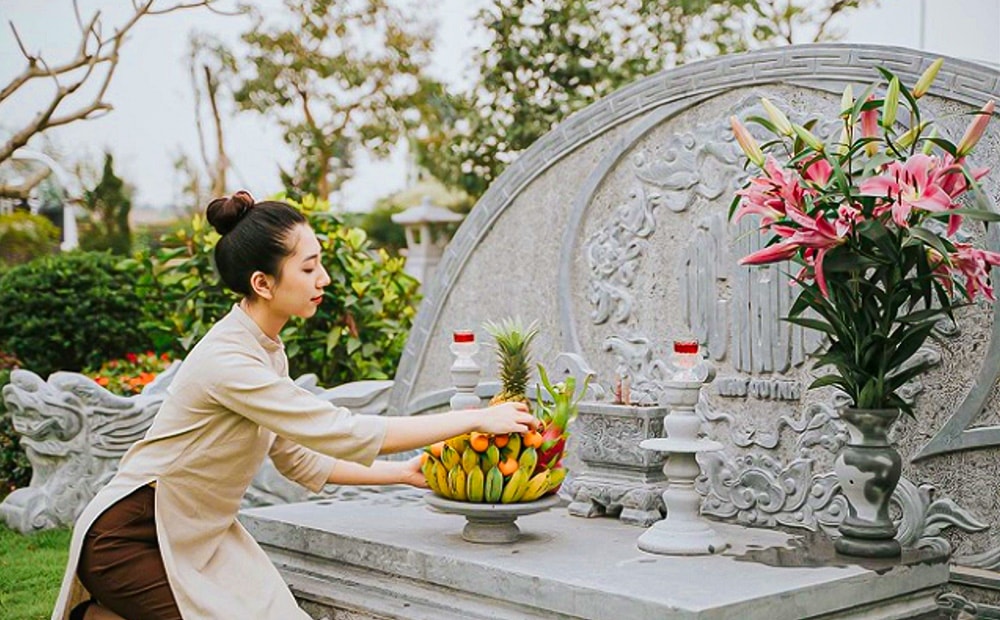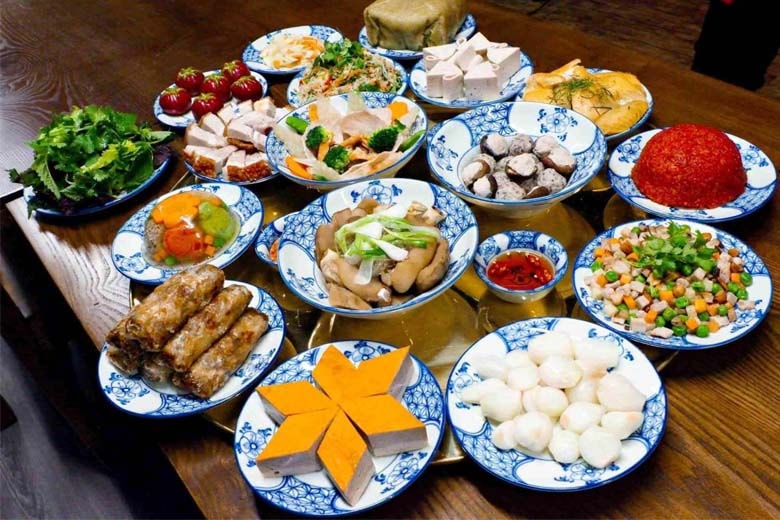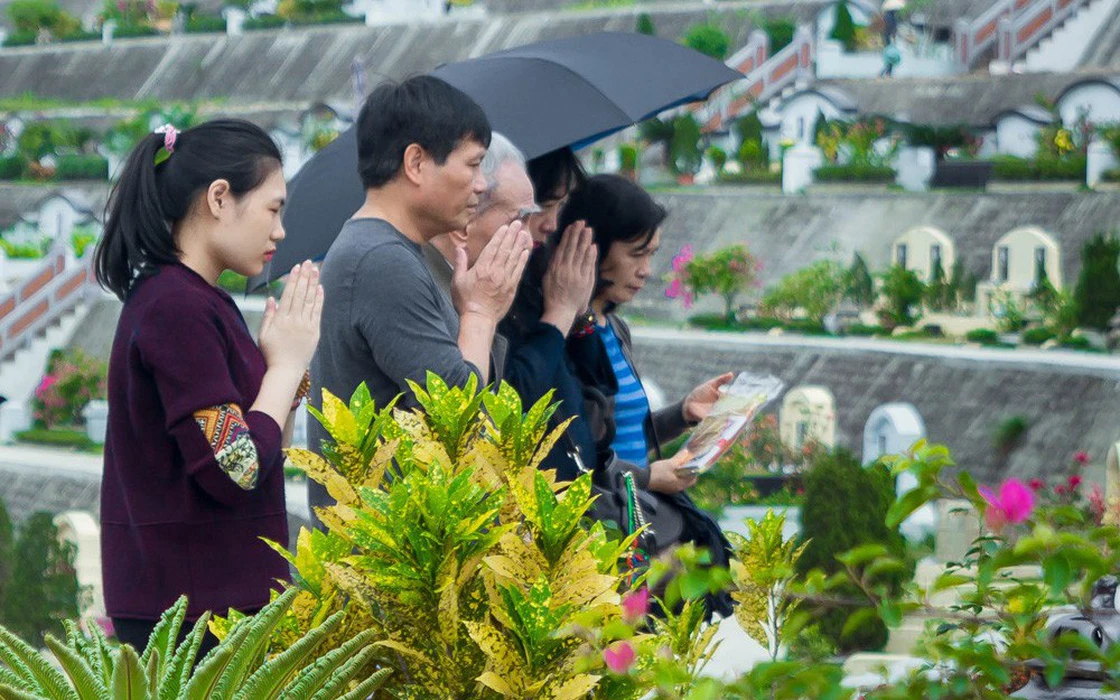Prayers, offerings for Thanh Minh Festival and things to note
During the Qingming Festival, Vietnamese people often show their respect to their ancestors by burning incense, visiting graves and preparing thoughtful offerings. Below are detailed instructions on how to prepare offerings, prayers and things to pay special attention to when visiting graves on this occasion.
What time is Qingming Festival this year?
Qingming Festival begins about 60 days after the beginning of spring and 105 days after winter solstice, lasting for 15 days. The first day of Qingming Festival is often called Qingming Festival.
During this period, people can choose any suitable day to visit the graves, not necessarily the first day.
In 2025, Qingming Festival will take place from April 4-5 (after the end of the spring equinox) and end around April 20-21 (when the Guwu Festival begins). During this time, families will prepare offerings, go to their ancestors' graves to burn incense, clean and perform ceremonies.
.png)
Prepare offerings for Qingming Festival
Offerings on this occasion do not need to be elaborate but must be complete, showing solemnity and sincerity.
Offerings should be fresh and beautiful, especially three-colored roses, odd numbers like 9 flowers to maintain the balance of yin and yang.
The fruit tray includes seasonal fruits such as mango, dragon fruit, papaya, apple, orange, sapodilla… to symbolize the five elements.
Other essential items include: a cup of wine, a glass of water, a cup of tea, rice, salt, and cigarettes. Additionally, you should prepare a plate of sticky rice and a slice of pork roll or vegetarian food depending on your situation.
The votive offerings include a golden horse, gold coins and votive paper to burn for the deceased.

Things to note when visiting graves on Qingming Festival
When visiting graves, you should maintain a solemn and respectful attitude. You should avoid choosing remote locations with few people passing by, especially if the person going is weak or easily affected by spiritual influences. It is best to go in a large group to be safe and avoid risks.
When visiting a cemetery, be polite and avoid stepping on other people's graves or offerings. Ancestral graves should be cleared of weeds, filled with new soil, and filled with fresh flowers.
Do not only clean the front and forget the back of the grave, because according to folk beliefs, the back is also very important in feng shui.
Women who are menstruating or pregnant should limit visiting graves because they can easily get cold air, which is not good for their health.
People with flu, fatigue, and pain should stay home and just pray.
After visiting the graves, people with weak constitutions should step over a fire basin or sprinkle grapefruit leaf water to dispel evil spirits and ensure mental safety.
Another important thing is not to take group photos around the tomb, because this is a sacred place and requires respect.
In addition, when detecting stagnant water, seepage or near a pond around the grave, attention should be paid to handling to avoid affecting the feng shui and fortune of the family.
Where and how to worship Thanh Minh?
Vietnamese people often celebrate Thanh Minh Festival in two places: at the ancestors' graves and at the family altar.

The offerings can be meat or vegetarian, depending on the beliefs of each family. Some families choose vegetarian offerings to avoid killing, helping the deceased to easily reach nirvana.
When arriving at the cemetery, if there is a communal altar, place the offerings there. If not, prepare a separate table or pedestal to place the offerings on. Never place them directly on the ground.
The homeowner will light incense, candles and recite prayers. While waiting for the incense to burn, they will clean the grave and repair any damage.
After the incense has burned about two-thirds, perform a thanksgiving ceremony, burn votive papers, and ask for blessings to bring home to continue the worship at home. The worship at home also needs to be solemn and follow proper rituals.

The order is to worship the gods first, then the ancestors. When offering incense, clasp your hands together, raise them to your forehead, bow three times, then place the incense in the bowl.
After that, the homeowner recites the prayer to the ancestors, bows three more times, and waits for the incense to burn out before burning the votive paper. In every step, the worshiper must maintain sincerity and respect, absolutely not joking or being distracted.
Qingming Festival Prayer – Qingming Festival in the House
Namo Amitabha Buddha (3 times).
I bow to the nine directions of heaven, the ten directions of Buddhas, the Buddhas of the ten directions.
I respectfully bow to the Emperor of Heaven and the Mother of Earth, and all the deities.
I pay homage to the local spirits who rule over this area.
Today is the day: (read the day according to the lunar calendar).
We are the believers: (name of the person making the vow).
Residing at: (address of the believer's home).
On the occasion of Thanh Minh festival, I sincerely prepare offerings, betel leaves and areca nuts, flowers, tea and fruit, light incense sticks and respectfully present them before the altar, and respectfully invite the deities to come and supervise.
Our family has a grave of: (father, grandfather or great-grandfather, great-grandfather according to the role of the person in the grave compared to the believer), buried in this land, now want to renovate and build.
Therefore, we respectfully inform the gods, the local gods, the land gods, the dragon veins, the front vermillion bird, the back black tortoise, the left blue dragon, the right white tiger, and the deities who govern this area.
We respectfully invite the gods to witness our sincerity, enjoy our offerings, and bless the souls to rest in peace and liberation.
We respectfully ask you to bless our entire family with good health and peace, to be free from illness in all four seasons, and to enjoy peace in all eight festivals.
Namo Amitabha Buddha (3 times).
Prayer for the deceased at the grave according to the book of Traditional Vietnamese Prayers
Namo Amitabha Buddha (3 times).
I bow to the nine directions of heaven, the ten directions of Buddhas, the Buddhas of the ten directions.
I respectfully bow to the spirit of: (name of person under the grave, if they are ancestors who have passed away, they can be called Tam Dai, Tu Dai...).
Today is the day: Qingming Festival.
We, the believers, are:
Residing at:
We and our entire family, thanks to your birth and upbringing, your great virtue, have built the career of... (the person in the grave).
I sincerely prepare offerings, betel leaves and areca nuts, flowers, tea, fruit, light incense sticks and respectfully present them at the grave, respectfully inviting the spirit (grandfather, grandfather, father...) to come and enjoy.
We would like to repair the grave, fill the ground and soil to make it thicker and more durable, and repair the main hall to make it more solid.
I bow down and ask the spirits to witness, enjoy the offerings, bless and protect my children and grandchildren, and pass by and watch over my home. Cover my ears and save me from disasters, bestow wealth and fortune, bring good things and ward them off.
May your family prosper and your cinnamon and locust trees flourish. We offer our humble offerings with all our hearts, and ask you to witness this.
Namo Amitabha Buddha! (3 times).
Prayer for ancestor worship at home according to the book of traditional Vietnamese prayers
Today is the... day... month... year...
Now I, the one who holds the responsibility of worshiping, named...,...., age, born in commune..., district...., province...., together with my whole family, bow my head in worship before the ancestral altar.
Please invite the Kitchen Gods to come and help us.
Respectfully offer: Betel and wine, tea, water, gold, incense, fruits and sincere gifts on the occasion of...
We respectfully invite the souls of our ancestors, paternal and maternal grandparents, parents, aunts, uncles, brothers and sisters to witness and enjoy the ceremony.
Qingming Festival is not only an occasion to pay tribute to ancestors but also an opportunity for family reunion, reminding descendants to remember their roots. If the offerings and tomb sweeping are prepared carefully and properly, it will bring peace and luck to the whole family throughout the year.


